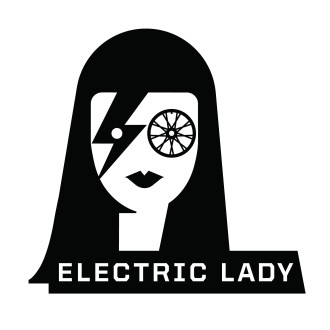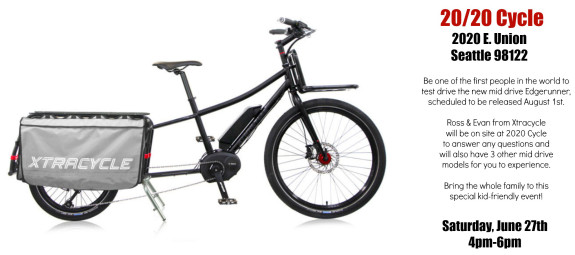 Alex Kostelnik built 20/20 Cycle out of little more than a couple maxed out credit cards and a serous desire to create a bike shop in the Central District focused on getting any old bike rolling again.
Alex Kostelnik built 20/20 Cycle out of little more than a couple maxed out credit cards and a serous desire to create a bike shop in the Central District focused on getting any old bike rolling again.
Perhaps more than any other shop I’ve been to, 20/20 staff always default to fixing what’s on a bike rather than jumping straight to replacing parts. It’s a shop that genuinely believes in helping people save money and get every inch of life out of their bike (from a 2012 interview: “We cater to moms with duct-taped Burley trailers with their kids inside on their way to Montessori school. People who ride in the rain, in the snow…”). It’s the only bike shop where I sometimes have to insist they take my money.
Since Velo moved from Capitol Hill to Belltown/Denny Triangle a few years ago, demand at 20/20 has boomed. Now, with a child in his family and 20/20 bursting at the seams, Kostelnik is planning another shop two blocks down the street with a very different focus: Electric cargo bikes.
“Think of it like a department store,” Kostelnik told Capitol Hill Seattle. “Only you go down the street to get to another department.”
The Electric Lady is scheduled to open in the under-construction building at 23rd and Union this December, CHS reports. The new shop will sell new bikes (they’ll be a Bianchi dealer) and 20/20’s shop bike, the Sealth. But the maturing market of Seattle-ready, kid-hauling cargo bikes will take center stage.
With the booming popularity of G&O Family Cyclery in Greenwood (a Seattle Bike Blog advertiser), which specializes in family cargo bikes, the Electric Lady is set to be part of a revolution in urban cycling in the city where bikes are replacing more and more tasks usually taken by car or truck.
If you want to learn more about the shop or the new Xtracycle Bosch Electric EdgeRunner (a simpler mid-drive electric cargo bike), swing by 20/20 Saturday afternoon between 4 and 6 p.m.
Read more about the Electric Lady on CHS:
“99% of my biking has been spent commuting by bike,” Kostelnik said. “I’m 47 and never owned a car.” Plus, Kostelnik is a new father — so he has a growing interest in the cargo end of a cargo bike.
Electric Lady, inspired by and named in the glow of amazement Kostelnik felt as his wife gave birth to his first child 10 months ago, will feature electric cargo bikes, a full line of new bikes, kits, gear including handmade bike bags and panniers, “and the best touring rack selection in Seattle.”
…
“I’ve been trying to sell cargo bikes for 10 years,” Kostelnik said. “It’s been a long road to get Seattle interested.” But the interest has arrived — especially in Central Seattle. Kostelnik said he saw the trends shift only recently as 20/20 began referring more and more customers to other shops to buy cargo-type bicycles that can better handle life’s loads.









Comments
8 responses to “20/20 Cycle owner plans Central District electric cargo bike shop: Electric Lady”
That is good news. It will show everyone the versatility of bicycles and help get people to ride instead of drive. A lot of people think of bicycle riding as a fancy road bike and spandex clothing. I ride a hybrid bicycle( half road, half mountain bike) , no spandex.
I followed one of these over Dexter and into downtown today — even with two little ones on the back, the cyclist was travelling at the same speed as 1-person road bikes. It was great!
That’s a nice moped!
With none of the drawbacks!
“None of the drawbacks”..
I’d call the fact that the majority of the people who use these things have no concept of how to ride a bike around other people, especially on MUP’s, a pretty large drawback. At least most people on gasoline mopeds have the decency to keep them on the street and not buzz people on bikes by inches with no call out or bell.
LC; that Edgerunner is a $6000 “pedelelec” with a European motor, while the motor may have increased power for the US market, it still probably is not exactly an electric motor cycle. People shelling out that kind of money probably have a clue, and if they are carrying their own kids, they likely ride with some care.
However there are not all that many who will spend that much, sure lots of people will say that sounds great, but when it comes down to laying sixty Benjamins on the counter…
A bike shop will be tempted to sell electric mopeds, such as; http://www.seattlebikeblog.com/2015/04/02/what-do-you-think-of-this-seattle-companys-new-e-fatbike/ to other sorts of people (cheek out the video at that link) in order to keep the doors open.
It’s the latter class that is going to be causing most of the problems, and possibly causing more restrictions (or more enforcement of existing regulations, even a 250W pedelecc can’t be legally ridden on side walks or the BGT)) for the first class of riders.
On the bright side, people who don’t want to expend any effort, who buy a cheap bike (that will break, perhaps sooner rather than later) may not actually be riding all that much.
Ok, in principle. However in application most people on ebikes are aging men who don’t want to put any effort into riding and who have no concept of trail etiquette, which if you’ve ridden around Seattle with any frequency* you would know.
*Driving the fam to Seward park Sundays doesn’t count.
I suspect electric-assist bikes suffer the same bias from cyclists that cyclists suffer from motorists.
That is, we notice the scofflaws, the rule breakers, the fast e-bike riders hopping onto sidewalks, the electric cargo bike illegally using the I-90 Trail, etc., the same way drivers notice people on bikes who run stop lights, ride on the wrong side of the street, fail to yield when entering the roadway, etc.
A well-ridden electric-assist bike with a courteous rider is so inconspicuous that we don’t even see it. Like any other bike, riding an e-bike safely and politely requires education and training and a bit of enforcement to catch the outliers.
I’d like to see reasonable rules that allow slower electric-assist bikes on the city’s trails — not the 20 mph top speed of the state’s current electric-assist bike regulations, that potentially-dangerous speed is why they’re banned from sidewalks state-wide and from most trails in the Puget Sound region.